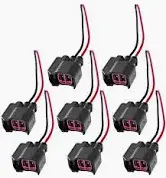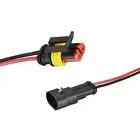
Wholesale Auto Parts in Miami
Wide Selection of Auto Parts for All Vehicle Makes and Models

Electrical
Electrical System FAQ
1. What are the main components of a car's electrical system?
A typical car electrical system includes:
-
Battery: Stores and supplies electrical energy to start the engine and power electrical components.
-
Alternator: Charges the battery while the engine runs and powers the vehicle's electrical systems.
-
Starter Motor: Initiates engine rotation to start the vehicle.
-
Fuses and Relays: Protect circuits from overloads and control electrical flow.
-
Wiring and Connectors: Distribute electrical power to various components.
-
Control Modules and Sensors: Manage and monitor vehicle systems for optimal performance.
2. How does the car's electrical system function?
The battery provides electrical power to the starter motor to begin engine operation. Once the engine starts, the alternator generates electricity to recharge the battery and supply power to electrical components. The system operates on a 12-volt DC circuit, with the vehicle's metal body often serving as the ground return path.
3. What are common signs of electrical system issues?
-
Dim or flickering headlights.
-
Unresponsive electronics (e.g., radio, power windows).
-
Difficulty starting the engine or a clicking noise when attempting to start.
-
Dashboard warning lights indicating electrical faults.
-
Frequent blown fuses.
4. What causes a car battery to die prematurely?
Common factors include:
-
Leaving lights or accessories on when the engine is off.
-
Corroded or loose battery terminals.
-
Faulty alternator not charging the battery properly.
-
Extreme temperatures affecting battery performance.
-
Parasitic drains from malfunctioning components.
5. Can I perform electrical repairs myself?
Basic tasks like replacing fuses, cleaning battery terminals, or replacing a dead battery can be done at home with proper tools. However, for complex issues such as faulty wiring, alternator problems, or diagnosing control module errors, it's advisable to consult a professional mechanic to avoid further damage.
6. How can I maintain my car's electrical system?
-
Regularly inspect and clean battery terminals to prevent corrosion.
-
Check the alternator's output to ensure it's charging the battery effectively.
-
Replace blown fuses promptly to prevent circuit overloads.
-
Inspect wiring for wear or damage and repair as needed.
-
Use a multimeter to test voltage and continuity during troubleshooting.
7. Are electrical repairs covered by insurance?
Insurance may cover electrical repairs if they result from an accident or other covered events. It's essential to review your policy details or consult with your insurance provider to understand coverage specifics.
8. What causes fuses to blow in my car?
Fuses protect your vehicle's electrical circuits from overloads. Common causes of blown fuses include:
-
Overloaded Circuits: Using too many electrical devices simultaneously can exceed the circuit's capacity.
-
Short Circuits: Damaged wiring can cause electricity to flow along an unintended path, leading to a short.
-
Faulty Components: Malfunctioning electrical parts can draw excessive current, blowing the fuse.
If fuses blow repeatedly, it's advisable to consult a professional mechanic to identify and resolve the underlying issue.
9. How can I prevent battery corrosion?
Battery corrosion can impede electrical flow and shorten battery life. To prevent it:
-
Apply Dielectric Grease: Use silicone-based grease on battery terminals every 2 to 6 months to prevent corrosion buildup.
-
Regular Cleaning: Clean terminals with a specialized solution if corrosion is present, ensuring the battery is disconnected safely before cleaning.
10. Can using my phone charger drain my car battery?
Yes, charging devices like smartphones can drain your car battery, especially if done without the engine running. Smartphones consume a portion of the battery's charge during use or charging. To minimize battery drain, avoid charging devices when the engine is off, and be mindful of the condition of your car battery and the charging standards you're using.
11. Why is my car zapping me when I touch it?
Experiencing a static shock when touching your car is typically due to static electricity buildup, especially in dry conditions. This occurs from friction between clothing and car seats. To reduce static shocks:
-
Use Antistatic Measures: Apply antistatic spray to seats, install a static strap to ground the car, or use an antistatic keychain to safely discharge buildup.
12. Is it safe to jump-start another vehicle with my car running?
It's recommended to turn off your engine before jump-starting another vehicle. Keeping your car running can cause power surges that may damage your vehicle's electronic components. Modern cars have sensitive electronics that can be affected by such surges.













